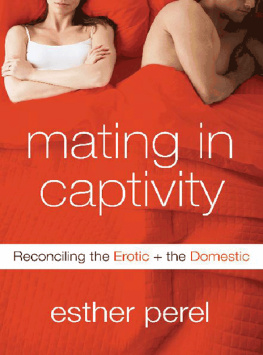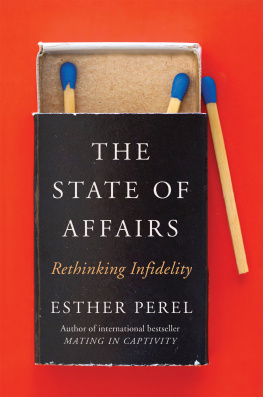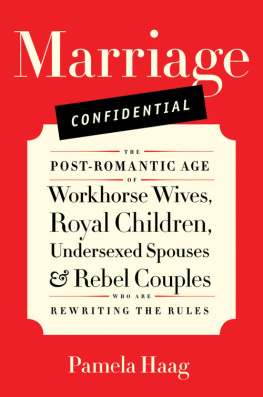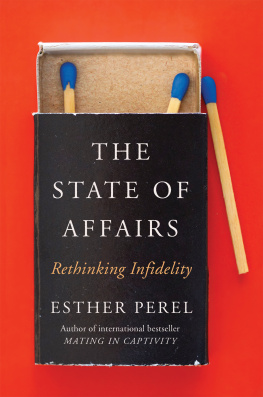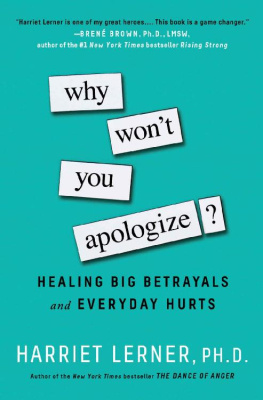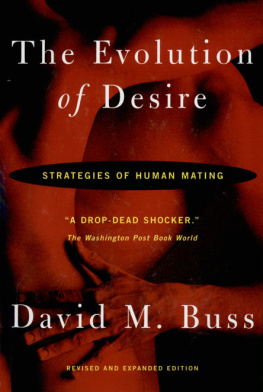wont breed, they mope, they die.
and the best wont breed, though they dont know why.
of desire is distorted and twisted awry.
the young ones copulate, hate it, and want to cry.
Sex is a state of grace.
In a cage it cant take place.
Break the cage then, start in and try.
D. H. Lawrence
T HE STORY OF SEX IN committed modern couples often tells of a dwindling desire and includes a long list of sexual alibis, which claim to explain the inescapable death of eros. Recently, it seems, everyone from the morning news to the New York Times has weighed in on the topic. They warn us that too many couples are having infrequent sex even when the partners profess to love each other. Todays twosomes are too busy, too stressed, too involved in child rearing, and too tired for sex. And if all this isnt enough to dull their senses, then its the antidepressants meant to alleviate the stress that set off the final unraveling. This is indeed an ironic development for the baby boomers who some thirty years ago ushered in a new age of sexual liberation. Now that these men and women and the generations who have followed can have as much sex as they want, they seem to have lost their desire for it.
Though I have no quarrel with the accuracy of these reports in the mediaour lives are surely more stressful than they should beit seems to me that in focusing almost exclusively on the frequency and quantity of sexual relations, they address only the most superficial reasons for the malaise so many couples are feeling. I think theres more to the story.
Psychologists, sex therapists, and social observers have long grappled with the Gordian knot of how to reconcile sexuality and domesticity. Were offered prolific advice on how to shop in the spice market to add additional flavors to committed sex. Languishing desire, were coached, is a scheduling problem that can be fixed with better prioritizing and organizational skills; or it is a communication problem that can be ameliorated by verbally expressing precisely what we want sexually.
Im less inclined toward a statistical approach to sexwhether youre still having it, how often, how long it lasts, who comes first, and how many orgasms you have. Instead, I want to address the questions that dont have easy answers. This book speaks about eroticism and the poetics of sex, the nature of erotic desire and its attendant dilemmas. When you love someone, how does it feel? And when you desire someone, how is it different? Does good intimacy always lead to good sex? Why is it that the transition to parenthood so often spells erotic disaster? Why is the forbidden so erotic? Is it possible to want what we already have?
We all share a fundamental need for security, which propels us toward committed relationships in the first place; but we have an equally strong need for adventure and excitement. Modern romance promises that its possible to meet these two distinct sets of needs in one place. Still, Im not convinced. Today, we turn to one person to provide what an entire village once did: a sense of grounding, meaning, and continuity. At the same time, we expect our committed relationships to be romantic as well as emotionally and sexually fulfilling. Is it any wonder that so many relationships crumble under the weight of it all? Its hard to generate excitement, anticipation, and lust with the same person you look to for comfort and stability, but its not impossible. I invite you to think about ways you might introduce risk to safety, mystery to the familiar, and novelty to the enduring.
On the way, we will address how the modern ideology of love sometimes collides with the forces of desire. Love flourishes in an atmosphere of closeness, mutuality, and equality. We seek to know our beloved, to keep him near, to contract the distance between us. We care about those we love, worry about them, and feel responsible for them. For some of us, love and desire are inseparable. But for many others, emotional intimacy inhibits erotic expression. The caring, protective elements that foster love often block the unselfconsciousness that fuels erotic pleasure.
My belief, reinforced by twenty years of practice, is that in the course of establishing security, many couples confuse love with merging. This mix-up is a bad omen for sex. To sustain an lan toward the other, there must be a synapse to cross. Eroticism requires separateness. In other words, eroticism thrives in the space between the self and the other. In order to commune with the one we love, we must be able to tolerate this void and its pall of uncertainties.
With this paradox to chew on, consider another: desire is often accompanied by feelings that would seem to cramp loves style. Aggression, jealousy, and discord come to mind, for starters. I will explore the cultural pressures that shape domesticated sex, making it fair, equal, and safe, but also producing many bored couples. Id like to suggest that we might have more exciting, playful, even frivolous sex if we were less constrained by our cultural penchant for democracy in the bedroom.
To buttress this notion, I take the reader on a detour into social history. Well see that contemporary couples invest more in love than ever before; yet, in a cruel twist of fate it is this very model of love and marriage that is behind the exponential rise in the divorce rate. Here it behooves us to question whether traditional marital structures can ever meet the modern mandate, especially when till death do us part entails a life span double that of past centuries.
The magic elixir thats meant to make this possible is intimacy. Well get to the bottom of this by looking through various lenses, but here its worth pointing out that the stereotype of women as entirely romantic and men as sexual conquistadors should have been dispelled a long time ago. The same goes for any ideas that cast women as longing for love, essentially faithful, and domestically inclined, and men as biologically non-monogamous and fearful of intimacy. As a result of social and economic changes that have occurred in recent western history, traditional gender lines have been circumvented, and these qualities are now seen in both men and women. While stereotypes can hold considerable truth, they fall short of capturing the complexities of contemporary relationships. I seek a more androgynous approach to love.
As a couples therapist, I have inverted the usual therapeutic priorities. In my field we are taught to inquire about the state of the union first and then ask how this is manifested in the bedroom. Seen this way, the sexual relationship is a metaphor for the overall relationship. The underlying assumption is that if we can improve the relationship, the sex will follow. But in my experience, this is often not the case.
Traditionally, the therapeutic culture has favored the spoken word over the expressiveness of the body. Yet sexuality and emotional intimacy are two separate languages. I would like to restore the body to its rightful prominent place in discussions about couples and eroticism. The body often contains emotional truths that words can too easily gloss over. The very dynamics that are a source of conflict in a relationshipparticularly those pertaining to power, control, dependency, and vulnerabilityoften become desirable when experienced through the body and eroticized. Sex becomes both a way to illuminate conflicts and confusion around intimacy and desire and a way to begin to heal these destructive splits. Each partners body, imprinted as it is with the individuals history and the cultures admonitions, becomes a text to be read by all of us together.

